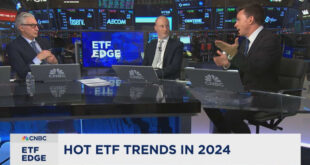Getty | mihailomilovanovic
The federal debt-ceiling standoff and the specter of a possible recession on the horizon may mean turbulent times ahead for the stock market — and that’s especially worrisome for retirees who rely on their investment portfolios for income.
Retirees are generally advised to hold some stocks as part of their nest egg. Stocks serve as a long-term growth engine, helping to beat inflation’s negative impact over decades of retirement in a way that cash and bonds generally can’t.
But pulling too much money from stocks during periods of sustained losses can be dangerous for retirees. The risk is particularly acute for people who’ve recently retired.
More from Personal Finance:
Credit card debt nears $1 trillion
How to get started with investing, budgeting
How much emergency savings you really need
Fortunately, there are ways retirees can cut that risk.
“You really have two defenses if you’re retired and are pulling from your portfolio for your living expenses,” said Christine Benz, director of personal finance and retirement planning at Morningstar.
One of those defenses is changing the source of withdrawals — for example, pulling from cash or bonds instead of stocks. Ideally, retirees would pull from an asset type that hasn’t been declining in value, Benz said.

That’s sometimes a tough proposition: 2022 was a rare case when stocks and bonds both suffered steep losses.
The second defense is to reduce the overall dollar amount retirees withdraw from their investments, Benz said.
Why retirees need to be careful
Here’s the crux of the issue: When the stock market pulls back, investors must sell more of their stocks to generate the same level of income. When the market eventually stabilizes and swings positive, the portfolio has less of a runway for growth.
If retirees aren’t careful, this dynamic may cause them to run out of money sooner than expected in their later years.
Here’s one way to think about it: Retirees often peg the amount of their annual withdrawal to a percentage of their portfolio, perhaps somewhere in the range of 3% to 5%.
If a retiree continues to pull the same dollar amount from that portfolio after stocks suffer a prolonged decline, that share could jump to 7% or 8%, for example — a perhaps-unsustainable amount that inadvertently hobbles the portfolio, said David Blanchett, head of retirement research at PGIM, the investment management arm of Prudential Financial.
The key is flexibility, to the extent retirees have wiggle room, he said.
Caveats
There are many caveats here.
For one, a stock-market pullback isn’t guaranteed in the near term. U.S. lawmakers may reach a debt-ceiling deal by early June and avert likely financial chaos.
And while Federal Reserve economists expect the U.S. to tilt into a mild recession later this year, it’s not guaranteed. Neither is a stock-market pullback if an economic downturn does materialize; while stocks frequently contract during recessions, there are instances (like in the early 1980s and 1990s) when that didn’t happen, according to a Morningstar analysis.
Further, adjusting withdrawal behavior is more important for younger retirees — especially healthier ones expecting to tap their nest egg for decades.
You really have two defenses if you’re retired and are pulling from your portfolio for your living expenses.
Christine Benz
director of personal finance and retirement planning at Morningstar
Consider this illustration of risk from Charles Schwab, which examines two newly retired individuals with $1 million portfolios and $50,000 annual withdrawals (adjusted for inflation).
The only difference between them is when each experiences a 15% portfolio loss. One suffers a 15% decline in the first two years of retirement, and a 6% gain each year thereafter. The other has a 6% annual gain for the first nine years, a negative 15% return in years 10 and 11, and a 6% annual gain thereafter.
Here’s the kicker: The first investor would run out of money after 18 years, while the second would have about $400,000 left.
It may also be easier for certain retirees to be flexible than others.
For example, some may cover all or the majority or all of their necessities (like food and housing costs) from guaranteed income sources like Social Security, a pension or an annuity. They may more easily be able to throttle back spending from stocks or a broader investment portfolio, if it’s largely being tapped just for discretionary purchases like vacations and entertainment.
How to be flexible
Marko Geber | Digitalvision | Getty Images
Here’s one easy rule of thumb: Using your personal life expectancy to determine if you’re withdrawing a safe amount of money from year to year, Blanchett said.
(There are many online calculators that estimate how long you’ll live — and therefore how long you must make your retirement savings last. Blanchett recommends the Actuaries Longevity Illustrator from the American Academy of Actuaries and Society of Actuaries.)
The calculation is simple: Divide 1 by your life expectancy, which will yield a reasonable starting point (in percentage terms) for a safe portfolio withdrawal.
For example, if a retiree determines their longevity to be 20 years, they’d use this calculation: 1/20 X 100. That yields a 5% withdrawal rate.
“It’s really important to take the temperature of the withdrawal rate on an ongoing basis,” Blanchett said.
 EU News Digest Latest News & Updates
EU News Digest Latest News & Updates



